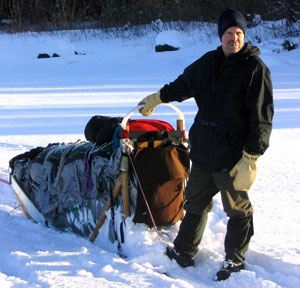 | ||
| Jim Neale pauses during a 10 dog-sledding expedition in Northern Minnesota. On another trip, he undertook a month-long trek to the Everest base-camp in Nepal. | ||
Jim Neale, of Personnel Services, was on the Nova Scotia Outdoor Leadership Development Committee set up by Minister of Sport and Recreation. As part of a dog-sledding expedition in the Boundary Waters Wilderness Canoe Area in northern Minnesota along the Canadian border, he slept outside using tarps for shelter, while temperatures plummeted to -30C, and wolves circled the camp at night. "There are a couple of things that I'd emphasize for Nova Scotia. Keep dry at all costs! The potential to get wet and then cold in our climate is very high. Don't get wet from the outside in (wet snow) or inside out (perspiration). Control your heat loss.
Try to get into similar, but controlled, situations before doing the real thing! Be careful about the strong desire to get out.
The one thing that's quite controversial is the value of a fire in our climate the wood is often very wet and difficult to get burning, the chances of loosing a lot of heat is high, the chances of getting wet building the fire is high, the gains may not be great enough - for many, building a fire is a given; I would avoid it in most circumstances."
Also see: |
Catherine Young, of Communications and Marketing, is a game show veteran ("Sale of the Century", "Definition", "Split Second" and "Guess What") and a one-day "Jeopardy!" champion.
"On the face of it, the challenge of staying in an igloo for 24 hours with 24 other people would seem to be very different from that of a game show. But the common aspect is that you have to be in top mental shape. I would advise Holly (and Pat) to eat very well for the days before the challenge. Stay hydrated and don't get hungry because if your body runs out of fuel, you lose both your physical and mental edge.
Get lots of exercise beforehand because you won't be able to while you are in the ice house. Lastly, work diligently on mental toughness. Knowing Holly, I think she has an edge on that count. She also has an advantage because she has actually lived in a real igloo for a time.
The worst part of the contest will be the crowding and the claustrophobia."
 | ||
| Romesh Vadivel and his dive mate used an underwater camera to capture some of the wonder of the lake beneath the ice. | ||
Romesh Vadivel, of the Registrar's Office, has more than 100 cold water dives, and is a certified instructor for ice, night and wreck diving. He offers some tips for "surviving under the ice." "Gearing up for the Canadian winter can be fun, if you know what you're in for. Still, it's hard to know why I thought ice-diving was such a good idea in the first place.
I wondered how I would adapt to the cold new environment beneath the ice, standing on the edge of a hole we had cut, staring down into the water. The surface temperatures hovered around -20C, the wind blowing spindrift across the frozen expanse around us. A few moments later, I hovered 4 meters below the surface, tethered to my divebuddy, staring out into the crystal waters of the lake. The world around me funneled down to dealing with the few simple tasks I knew I had to perform if I was to continue safely with the dive. Some 45 minutes later, my dive partner and I emerged from the lake, flash-frozen wetsuits and divegear glinting in the harsh sun. In a matter of seconds upon exiting the hole in the ice, we were covered in an inch-thick rime of ice which served to protect us from the frigid wind.
I often remember just what it was that I felt shortly after exiting that hole in the frozen lake ice. I often think back to why I'd chosen to experience the biting cold and the freezing water. What it amounts to is that for me, experiencing and coping with the cold has been rendered down to a state of mind. And in this semi-meditative focused frame of mind, I've learned to accept and deal with the cold in my own way. More importantly though, I've learned to recognize my limits, and when to get out of the water and back into the warmth."
